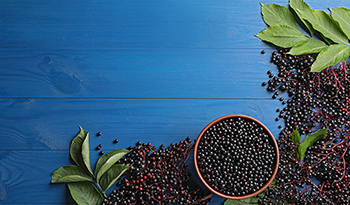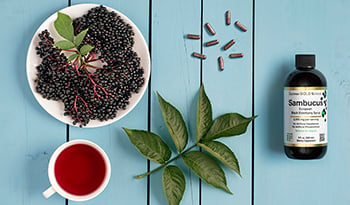Fight Illness With These Natural Immunity Boosters

Every day we are all exposed to organisms that have the potential to not only make us sick. But our immune system immune system is well-tuned to handle invaders. Whether a person gets sick or not is often based on the strength of their immune system.
The immune system is very complex, so making it as strong as possible requires a comprehensive approach that involves a health-promoting lifestyle, stress management, exercise, diet, and the appropriate use of nutritional supplements and herbal medicines.
Here are some simple recommendations that can help your immune system function better.
Vitamins for Immune Health
The health of the immune system is greatly influenced by nutritional status. An overwhelming amount of research data indicates that any single nutrient deficiency can profoundly impair the immune system.1 Unfortunately, nutrient deficiency, especially for vitamins and minerals essential to a well-functioning immune system, is common.
In the latest analysis from National Health and Nutrition Examination Surveys (NHANES) in the United States, it was found inadequate intakes for many critical nutrients for the immune system such as vitamin D3 (95%), vitamin E (84%), vitamin C (46%), vitamin A (45%), and zinc (15%).2 Taking a high potency multiple vitamin and mineral supplement that provides the recommended daily allowance (RDA of these important immune supportive nutrients and other essential nutrients acts as a nutritional “insurance policy” that sufficient levels of these nutrients are being ingested.
Here are the vitamins essential for immune support:2
- Vitamin A is necessary for maintaining the cells of the skin and the mucous membranes that act as the first lines of defense against infection. In addition, vitamin A is necessary for proper white blood cell function and enhances many of the immune system’s activities, including thymus function, tumor-fighting activity, and antibody response.
- B vitamins, especially B1, B6, and B12, are required for making disease-fighting antibodies. In addition, B vitamins are essential to normal cell division. Therefore, low levels of B vitamins impair your body’s ability to make new white blood cells.
- Vitamin C turns on white blood cells to attack intruders and boosts antibody levels and response, secretion of hormones from the thymus., and enhances interferon, the body’s antiviral compound. When you have an infection or are under stress, your need for vitamin C increases.
- Vitamin D3 is important in protecting against viral or bacterial upper respiratory infections. It has been shown to produce a wide range of immune-enhancing effects including an ability to reduce the frequency of viral upper respiratory infections. In addition to the amount found in a multiple vitamin and mineral supplement, many health experts recommend taking 2,000-5,000IU of vitamin D3 daily to support immune function.
- Zinc is directly involved with immune function on many levels. When zinc levels are low, the number of white blood cells plummets, thymus hormone levels fall, enzyme production and activity decline, and certain white blood cell functions shut down.
- Selenium is involved in important antioxidant mechanisms that protect the thymus gland. People who are low in selenium have reduced immunity and lower antibody levels.
Best Foods for Immune Support
Optimal immune function requires a healthy diet that is (1) rich in whole, natural (preferably organic) foods, such as fruits, vegetables, whole grains, beans, seeds, and nuts, (2) low in fats and refined sugars, and (3) contains adequate, but not excessive, amounts of protein. On top of this, for optimal immune function, an individual should drink five or six 8-ounce glasses of water per day.
Some of the most important food components to enhance immune function are the carotenoids. Foods high in carotenoids include darkly colored vegetables, such as dark green leafy vegetables; yellow and orange squash, carrots, yams, and sweet potatoes; and green and red peppers. Studies back in the 1930s showed that the higher a child’s carotenoid intake the fewer the number of school days missed due to infections.3 More recent research has documented that carotenoids enhance many aspects of immune function.4
Other foods useful for boosting immune function include cabbage family vegetables (broccoli, Brussels sprouts, cabbages, cauliflower, collards, kale, and greens from mustard, radish, and turnip), flavonoid-rich berries, garlic and onions, and Jerusalem artichoke.
Raw nuts and seeds are also an important dietary consideration as they are an excellent source of natural vitamin E, which is also critical to immune health.2
And let’s not forget the importance of a higher vitamin C intake for boosting immune function. In addition to taking a vitamin C supplement, try to also increase the intake of high vitamin C content foods such as broccoli and kale, citrus fruits, berries, mango, and bell peppers. As for supplements, there are lots of options in capsules, liposomal forms, and powdered drink mixes. During an active infection, the need for vitamin C increases.2
Best Supplements for Immunity
Greens Powders
Generally, anything that increases a person's overall health should boost their immune system. A great example of this link is leafy green vegetables. Dark-green leafy vegetables are loaded with important micronutrients and phytochemicals that can boost immune function. The simplest way to get the advantages of leafy greens is to eat more of them as salads and side dishes (e.g., steamed spinach or kale). However, there may be even more benefits from “greens powders.”
Greens powders usually contain dehydrated barley grass, wheat grass, vegetable concentrates, or algae sources such as chlorella or spirulina. These products are rehydrated by simply mixing them with water or juice. Greens powders are particularly rich in phytochemicals that exert health benefits, including carotenes and natural fat-soluble chlorophyll – the green pigment used in the process of photosynthesis that converts sunlight to chemical energy in plants, algae, and some microorganisms. Including greens powders and fresh green vegetable juices regularly in the diet is a great way to easily fortify or supplement your intake of important phytochemicals often lacking in the modern diet.
Probiotics
Probiotics are the types of beneficial bacteria that humans get by ingesting certain types of fermented foods or dietary supplements. Probiotics can be found in several types of fermented foods, including yogurt, sauerkraut, kimchi, and kombucha. Read the label carefully to make sure there are live cultures in a potential probiotic food. There are also probiotics in dietary supplements, powders, and functional foods.
Probiotic supplementation is supported by significant clinical research with nearly 1,000 human double-blind, placebo-controlled studies. Much of the research has focused on the use of probiotics to support immune function and promote gastrointestinal health. Many mechanisms have been identified to explain the positive clinical effects. For example, probiotics can increase the secretion of immunoglobulin (Ig) A – an antibody that lines our intestinal tract to act as a first line of defense from infection. IgA is a nonspecific antibody that can bind to and neutralize unwanted microorganisms. Certain probiotics have also shown an ability to activate key cells of our immune system (natural killer cells, macrophages, and T-lymphocytes). These actions and many more support the general immune-enhancing effects of probiotics.5
Elderberry
Elderberries have been a part of traditional approaches to improving health worldwide. The European black elderberry (Sambucus nigra) is regarded as the most beneficial of the elderberries primarily due to its higher level of pigments known as anthocyanins responsible for its deep, dark purple color.
Elderberries and their components have been the subject of nearly 6,000 studies published in the scientific literature. These studies show black elderberry supports immune function and exerts beneficial actions if used at the onset of upper respiratory symptoms due to the common cold.6 Elderberry preparations are available as a syrup, liquid, or in capsules, tablets, or gummy.
Mushrooms
Mushrooms are starting to gain a lot of attention for many reasons including as an immunity booster. Most mushrooms supply special polysaccharides known as beta-glucans that promote immune function.7
In addition to increasing the dietary intake of medicinal mushrooms like maitake (Grifola frondosa), shitake (Lentinus edodes), reishi (Ganoderma lucidum), and Cordyceps sinensis that contain beta-glucans, there are dietary supplements containing beta-glucans from special preparations of baker’s yeast (Saccharomyces cerevisiae) that have considerable scientific support. Over a dozen human double-blind clinical studies have shown these concentrated beta-glucan sources at a dosage of 250 to 500 mg per day exert positive results in boosting immune function and reducing the signs, symptoms, frequency, and duration of the common cold.8
Ginger
Ginger is an excellent tool to boost the immune system. It contains a number of active compounds, but most of the benefits are due to its aromatic compounds such as gingerol. Considerable scientific research has identified ginger as a natural “immunomodulator” due to its widespread actions on helping the immune system function more optimally. Ginger components help the immune system because of their antioxidant, anti-inflammatory, and regulatory properties on the immune system.9
Although most scientific studies have used powdered ginger or ginger extracts, fresh ginger at an equivalent dosage is believed to yield even better results because it contains active enzymes and higher levels of the more active compounds like gingerol. Most human clinical studies have used 1g powdered ginger, this dosage would be equivalent to about 10g or one-third ounce fresh ginger, roughly a quarter-inch slice of the root. Those who have access to fresh ginger root can get its benefits by juicing it and taking it as a ginger shot or mixing in to fresh fruit or vegetable juices. Ginger root supplements are also widely available as a convenient alternative.
Garlic
Garlic has been referred to as “nature’s antibiotic” based on its historical use in infections. There are many active compounds in garlic that aid the immune system in fighting off illnesses. The most useful are derived from allicin, the sulfur-containing odorous compound of garlic, though there are several other garlic compounds that promote immune function. Since garlic is used in almost every type of cuisine across the world, adding more garlic to the diet is a simple immune system boost. However, the most effective form is raw garlic, which can have some social consequences. Those who want all the benefits of garlic without causing social distancing should look to garlic supplements instead including aged garlic extracts. In aged garlic extracts the allicin is converted into compounds that have shown significant immune supportive effects.10
Summary
Enhance your immune system naturally through a comprehensive approach. Incorporate essential vitamins such as C and D3, alongside nutrient-dense foods like leafy greens, berries, and garlic, to fortify your defenses. Additionally, consider powerful supplements like probiotics, elderberry, and mushrooms to support overall health. Prioritize your well-being and reinforce your immune system with these expert-recommended strategies.
References:
- Reider CA, Chung RY, Devarshi PP, et al. Inadequacy of Immune Health Nutrients: Intakes in US Adults, the 2005-2016 NHANES. Nutrients. 2020;12(6):1735.
- Gombart AF, Pierre A, Maggini S. A Review of Micronutrients and the Immune System-Working in Harmony to Reduce the Risk of Infection. Nutrients. 2020;12(1):236.
- Clausen SW. Carotenemia and resistance to infection. Trans Am Pediatr Soc 1931; 43:27–30.
- Toti E, Chen CO, Palmery M, Villaño Valencia D, Peluso I. Non-Provitamin A and Provitamin A Carotenoids as Immunomodulators: Recommended Dietary Allowance, Therapeutic Index, or Personalized Nutrition? Oxid Med Cell Longev. 2018 May 9;2018:4637861.
- Pramanik S, Venkatraman S, Karthik P, Vaidyanathan VK. A systematic review on selection characterization and implementation of probiotics in human health. Food Sci Biotechnol. 2023 Jan 10;32(4):423-440.
- Mocanu ML, Amariei S. Elderberries-A Source of Bioactive Compounds with Antiviral Action. Plants (Basel). 2022 Mar 10;11(6):740.
- Dong Y, Wang T, Zhao J, et al. Polysaccharides Derived from Mushrooms in Immune and Antitumor Activity: A Review. Int J Med Mushrooms. 2023;25(8):1-17. doi: 10.1615/IntJMedMushrooms.2023049062. PMID: 37560886.
- Zhong K, Liu Z, Lu Y, Xu X. Effects of yeast β-glucans for the prevention and treatment of upper respiratory tract infection in healthy subjects: a systematic review and meta-analysis. Eur J Nutr. 2021 Dec;60(8):4175-4187.
- Ayustaningwarno F, Anjani G, Ayu AM, Fogliano V. A critical review of Ginger's (Zingiber officinale) antioxidant, anti-inflammatory, and immunomodulatory activities. Front Nutr. 2024 Jun 6;11:1364836. doi: 10.3389/fnut.2024.1364836. PMID: 38903613; PMCID: PMC11187345.
- Zugaro S, Benedetti E, Caioni G. Garlic (Allium sativum L.) as an Ally in the Treatment of Inflammatory Bowel Diseases. Curr Issues Mol Biol. 2023 Jan 11;45(1):685-698.
DISCLAIMER:This Wellness Hub does not intend to provide diagnosis...
















































































 Table of Contents
Table of Contents
















